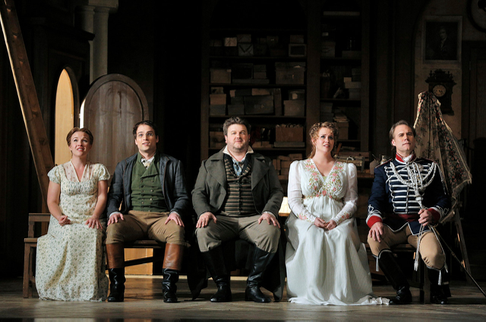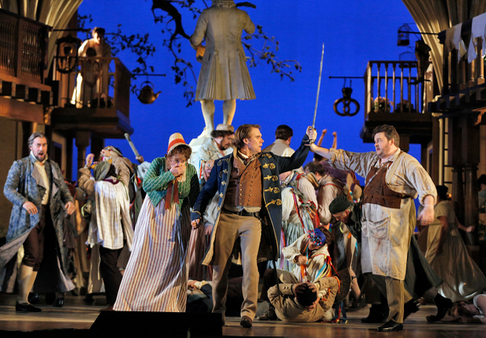Recently in Reviews
English Touring Opera are delighted to announce a season of lyric monodramas to tour nationally from October to December. The season features music for solo singer and piano by Argento, Britten, Tippett and Shostakovich with a bold and inventive approach to making opera during social distancing.
This tenth of ten Live from London concerts was in fact a recorded live performance from California. It was no less enjoyable for that, and it was also uplifting to learn that this wasn’t in fact the ‘last’ LfL event that we will be able to enjoy, courtesy of VOCES8 and their fellow vocal ensembles (more below …).
Ever since Wigmore Hall announced their superb series of autumn concerts, all streamed live and available free of charge, I’d been looking forward to this song recital by Ian Bostridge and Imogen Cooper.
The Sixteen continues its exploration of Henry Purcell’s Welcome Songs for Charles II. As with Robert King’s pioneering Purcell series begun over thirty years ago for Hyperion, Harry Christophers is recording two Welcome Songs per disc.
Although Stile Antico’s programme article for their Live from London recital introduced their selection from the many treasures of the English Renaissance in the context of the theological debates and upheavals of the Tudor and Elizabethan years, their performance was more evocative of private chamber music than of public liturgy.
In February this year, Albanian soprano Ermonela Jaho made a highly lauded debut recital at Wigmore Hall - a concert which both celebrated Opera Rara’s 50th anniversary and honoured the career of the Italian soprano Rosina Storchio (1872-1945), the star of verismo who created the title roles in Leoncavallo’s La bohème and Zazà, Mascagni’s Lodoletta and Puccini’s Madama Butterfly.
Evidently, face masks don’t stifle appreciative “Bravo!”s. And, reducing audience numbers doesn’t lower the volume of such acclamations. For, the audience at Wigmore Hall gave soprano Elizabeth Llewellyn and pianist Simon Lepper a greatly deserved warm reception and hearty response following this lunchtime recital of late-Romantic song.
Collapsology. Or, perhaps we should use the French word ‘Collapsologie’ because this is a transdisciplinary idea pretty much advocated by a series of French theorists - and apparently, mostly French theorists. It in essence focuses on the imminent collapse of modern society and all its layers - a series of escalating crises on a global scale: environmental, economic, geopolitical, governmental; the list is extensive.
For this week’s Live from London vocal recital we moved from the home of VOCES8, St Anne and St Agnes in the City of London, to Kings Place, where The Sixteen - who have been associate artists at the venue for some time - presented a programme of music and words bound together by the theme of ‘reflection’.
'Such is your divine Disposation that both you excellently understand, and royally entertaine the Exercise of Musicke.’
Amongst an avalanche of new Mahler recordings appearing at the moment (Das Lied von der Erde seems to be the most favoured, with three) this 1991 Mahler Second from the 2nd Kassel MahlerFest is one of the more interesting releases.
‘And there was war in heaven: Michael and his angels fought against the dragon; and the dragon fought and his angels, And prevailed not; neither was their place found any more in heaven … that old serpent … Satan, which deceiveth the whole world: he was cast out into the earth, and his angels were cast out with him.’
If there is one myth, it seems believed by some people today, that probably needs shattering it is that post-war recordings or performances of Wagner operas were always of exceptional quality. This 1949 Hamburg Tristan und Isolde is one of those recordings - though quite who is to blame for its many problems takes quite some unearthing.
There was never any doubt that the fifth of the twelve Met Stars Live in Concert broadcasts was going to be a palpably intense and vivid event, as well as a musically stunning and theatrically enervating experience.
‘Love’ was the theme for this Live from London performance by Apollo5. Given the complexity and diversity of that human emotion, and Apollo5’s reputation for versatility and diverse repertoire, ranging from Renaissance choral music to jazz, from contemporary classical works to popular song, it was no surprise that their programme spanned 500 years and several musical styles.
The Academy of St Martin in the Fields have titled their autumn series of eight concerts - which are taking place at 5pm and 7.30pm on two Saturdays each month at their home venue in Trafalgar Square, and being filmed for streaming the following Thursday - ‘re:connect’.
The London Symphony Orchestra opened their Autumn 2020 season with a homage to Oliver Knussen, who died at the age of 66 in July 2018. The programme traced a national musical lineage through the twentieth century, from Britten to Knussen, on to Mark-Anthony Turnage, and entwining the LSO and Rattle too.
With the Live from London digital vocal festival entering the second half of the series, the festival’s host, VOCES8, returned to their home at St Annes and St Agnes in the City of London to present a sequence of ‘Choral Dances’ - vocal music inspired by dance, embracing diverse genres from the Renaissance madrigal to swing jazz.
Just a few unison string wriggles from the opening of Mozart’s overture to Le nozze di Figaro are enough to make any opera-lover perch on the edge of their seat, in excited anticipation of the drama in music to come, so there could be no other curtain-raiser for this Gala Concert at the Royal Opera House, the latest instalment from ‘their House’ to ‘our houses’.
"Before the ending of the day, creator of all things, we pray that, with your accustomed mercy, you may watch over us."
Reviews
![San Francisco Opera Chorus, Act 1 [Photo by Cory Weaver courtesy of San Francisco Opera]](http://www.operatoday.com/Meistersinger_SF1.png)
30 Nov 2015
Die Meistersinger von Nurnberg in San Francisco
Falstaff and Die Meistersinger are among the pinnacles if not the pinnacles of nineteenth century opera. Both operas are atypical of the composer and both operas are based on a Shakespeare play.
Verdi looks ahead, Wagner looks back. It is hard to tell if the current production of Wagner’s Die Meistersinger von Nürnburg on the War Memorial stage looks forward or backward. Happily it is a return to an international production standard, increasingly rare at SFO, with British stage director David McVicar’s 2011 Glyndebourne version of Wagner’s masterpiece.
The conceit of the production seems to be that there are no cuts whatsoever to Wagner’s score. This resulted in an evening of five hours and forty minutes. Knowingly conducted by Mark Elder it did feel somewhat briefer than that, maybe like just about five hours. Still it was a long, very long evening.
This excellent conductor, once the music director of English National Opera, gave a firm, powerful and satisfying traditional hand to the famous overture, a tone that dissolved into a convincing lyricism that prevailed for the duration.
The David McVicar production was all about home-spun tradition, in fact the most moving moments of this lovely, emotional evening were Hans Sach’s admonition to Walther that he respect artistic tradition and Walther’s acquiescence to such respect.
As Wagner intended the philosophical and artistic meat of the opera was the shoemaker Hans Sachs. The real i.e. historical Hans Sachs shoemaker lived to the ripe old Renaissance age of 82, and there are those of us who remember the silver haired Hans Sachs of the four [!] SFO Meistersinger productions between 1959 and 1971. Just now the youthfulness of 43 year-old British baritone James Rutherford — an accomplished artist of wide expressive range — seemed at odds with the gravity we wanted and needed to award Hans Sachs for the first two acts.
 The Act III quintet
The Act III quintet
But with Hans Sachs extended soliloquy that dominates the first scene of the third act we entered into a real and tortured, not yet age-resigned psyche. As Hans Sachs uncovered and contemplated a portrait of his dead wife and child his conflicts gained an apparent philosophical realness that took us to the elusive, profound plane Wagner wished to achieve. This high minded angst then dissolved into the famous quintet, the love triangle (Sachs, Eva and Walther) holding hands with the lesser beings (David and Lene) in a simple, soft lyricism that forsook the musical gravity that should illuminate this magnificent moment and make it magical.
 Ain Anger as Pogner, Rachel Willis-Sorensen as Eva, Brandon Jovanovich as Walther, James Rutherford as Sachs
Ain Anger as Pogner, Rachel Willis-Sorensen as Eva, Brandon Jovanovich as Walther, James Rutherford as Sachs
The McVicar production and the Mark Elder orchestra more than anything else worked to demystify Wagnerian thought and to quell Wagnerian rhetoric. Further example were the phenomenal complexities of mid-summer night riot chorus graphically reduced to a few dancers and children cavorting across the front of the stage, and as more example, the phenomenal choral complexities of the mid-summer day celebration graphically defined by three jugglers on stilts — fortunately the solidity of the musical preparation was not compromised by the fragility of the precarious balancing and juggling.
Director David McVicar’s slick stagecraft was always supported by conductor Mark Elder’s direct lyricism. As intended on the stage and from the pit the result was anything but intimidating and this despite the extraordinary length that was so wittily and unnecessarily imposed.
The production discretely toyed with Beckmesser, revealing but not dwelling on the famous anti-semitic polemic inherent to this opera. Here Beckmesser was superbly enacted by German baritone Martin Gantner who towed a very fine line between ridicule and caricature. Distinctly costumed in all-black he somehow evoked our sympathy within the larger warmth of the production. However at the end Beckmesser the Jew was left seated at the extreme edge of the stage, far from and pointedly exiled from the Wagnerian reconciliation of art and love.
San Francisco Opera’s casting perhaps inadvertently supported the home-spun nature of the production as it unfolded on the War Memorial stage. With the exception of the two baritones it was unpretentiously cast. Montana tenor Brandon Jovanovich was a vulnerable Walther whose prize song (“Morgenlich leuchtend im rosigen Schein") was just persuasive enough. Eva was sung by recent Houston Opera Studio graduate Rachel Willis-Sorensen whose tone I found shrill and whose vocal strength was not sufficient to hold together the quintet (not all my friends agree with me). Alek Shrader was vocally miscast though an exquisitely charming David while Sasha Cooke as Magdalene was vocally splendid. German bass Ain Anger as Eva’s father Veit Pogner added a further homey touch, his first act monologue shakily delivered.
It is a very great pleasure to hear San Francisco Opera’s fine orchestra and chorus in service to a fine conductor and a solid production.
Michael Milenski
Casts and production information:
Hans Sachs: James Rutherford; Walther von Stolzing: Brandon Jovanovich; Eva: Rachel Willis-Sorensen; Magdalene: Sasha Cooke; David: Alek Shrader; Sixtus Beckmesser: Martin Gantner; Veit Pogner: Ain Anger; Fritz Kothner: Philip Horst; Kunz Vogelgesang: AJ Glueckert; Balthasar Zorn: Joel Sorensen; Augustin Moser: Corey Bix; Ulrich Eisslinger: Joseph Hu; Konrad Nachtigall: Sam Handley; Hans Schwarz: Anthony Reed; Hermann Ortel: Edward Nelson; A night watchman: Andrea Silvestrelli; Hans Foltz; Matthew Stump; An apprentice: Laurel Porter. Chorus and Orchestra of the San Francisco Opera. Conductor: Sir Mark Elder; Production: Sir David McVicar; Revival Co-Directors: Marie Lambert and Ian Rutherford; Production Designer: Vicki Mortimer; Lighting Designer: Paule Constable; Choreography: Andrew George. War Memorial Opera House, San Francisco, November 24, 2016.
![San Francisco Opera Chorus, Act 1 [Photo by Cory Weaver courtesy of San Francisco Opera]](http://www.operatoday.com/Meistersinger_SF1.png)

